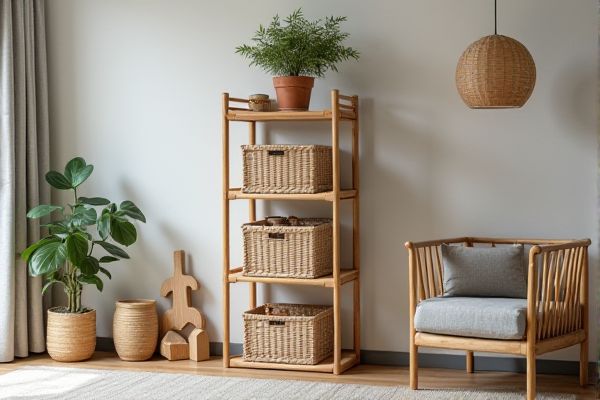
Adjustable basket towers offer flexibility in height and positioning, allowing you to customize storage solutions based on your specific needs, while fixed towers provide sturdy, permanent structures ideal for consistent use and heavy loads. Discover which tower type best suits your space and functionality requirements by reading the full article.
Table of Comparison
| Feature | Adjustable Basket Tower | Fixed Tower |
|---|---|---|
| Height Flexibility | Adjustable, can be modified to different heights | Fixed, set at a single height |
| Installation | Requires mechanisms for adjustment | Simple installation, no moving parts |
| Cost | Typically higher due to adjustable components | Usually lower, less complex design |
| Maintenance | Requires regular checks and upkeep of adjustment system | Low maintenance, durable structure |
| Use Cases | Ideal for variable height needs and versatility | Best for consistent, stable height requirements |
| Durability | May have reduced durability due to moving parts | Higher durability with fewer mechanical parts |
Introduction to Basket Towers: Adjustable vs Fixed
Adjustable basket towers offer flexibility in height modification and positioning, making them ideal for varied operational requirements and dynamic environments. Fixed basket towers provide stable, robust support with minimal maintenance, suited for permanent installations with consistent height needs. Understanding the operational context and load specifications is crucial for selecting between adjustable or fixed basket towers.
Key Features of Adjustable Basket Towers
Adjustable basket towers feature telescoping mechanisms that allow height customization, enhancing flexibility for different environments and user needs. They are constructed with durable, corrosion-resistant materials like galvanized steel or aluminum, ensuring long-term stability and safety. Their modular design supports easy assembly and disassembly, making them ideal for transport and storage compared to fixed towers.
Key Features of Fixed Basket Towers
Fixed basket towers are designed with a rigid, non-movable structure that ensures stability and durability in various industrial applications. These towers feature fixed baskets that maintain a consistent internal configuration for processes like distillation or absorption, optimizing separation efficiency. You benefit from low maintenance requirements and reliable performance due to the robust construction and fixed positioning of the internal components.
Performance Comparison: Adjustable vs Fixed Towers
Adjustable basket towers offer superior performance by allowing custom height and angle adjustments that optimize load distribution and reduce sway under varying wind conditions. Fixed towers provide consistent structural stability but lack flexibility, potentially leading to reduced efficiency in dynamic environments or during equipment maintenance. Your choice should consider site-specific factors, as adjustable towers improve adaptability and performance in variable conditions, whereas fixed towers emphasize durability and low maintenance.
Advantages of Adjustable Basket Towers
Adjustable basket towers offer increased flexibility by allowing users to modify the height and position of baskets to accommodate different storage needs, maximizing space efficiency. Their customizable design enhances accessibility, making it easier to organize and retrieve items compared to fixed towers with static shelves. You benefit from improved adaptability in dynamic environments, where storage requirements frequently change.
Benefits of Fixed Basket Towers
Fixed basket towers offer superior structural stability and reliability in industrial applications, minimizing maintenance needs and ensuring consistent performance under high-stress environments. Their rigid design provides enhanced resistance to wind loads and vibrations, making them ideal for long-term installations where durability is critical. You benefit from reduced operational risks and lower lifecycle costs by choosing a fixed basket tower for your infrastructure.
Suitability for Different Applications
Adjustable basket towers offer enhanced flexibility, making them ideal for applications requiring variable height and positioning, such as maintenance tasks on uneven terrain or construction sites with changing requirements. Fixed towers provide stability and durability suited for permanent installations like communication antennas or lighting systems where consistent height is crucial. Selecting between adjustable and fixed towers depends on the specific operational needs, including mobility, height variation, and long-term usage.
Cost Considerations and Value
Adjustable basket towers generally incur higher initial costs due to their complex design and enhanced flexibility for handling varying loads, offering long-term value through adaptability in different applications. Fixed towers, while more cost-effective upfront, provide limited operational versatility and may lead to additional expenses if modifications or replacements are required. Evaluating total cost of ownership highlights that adjustable towers deliver better value in dynamic environments, whereas fixed towers suit stable, predictable conditions with lower budget constraints.
Maintenance and Durability Analysis
Adjustable basket towers offer enhanced maintenance accessibility, allowing you to easily reposition basket levels for targeted repairs or cleaning, which can extend the lifespan of tower components. Fixed towers, while structurally robust, often require more intensive disassembly during maintenance, leading to longer downtime and higher labor costs. Durable materials such as galvanized steel or aluminum alloys improve both tower types, but adjustable towers typically provide better long-term value through simplified upkeep and reduced wear on mechanical joints.
Choosing the Right Basket Tower for Your Needs
Adjustable basket towers offer customizable height and angle settings, making them ideal for tasks requiring flexibility in positioning heavy loads or materials, enhancing safety and efficiency on dynamic job sites. Fixed towers provide robust stability and simpler installation, suited for consistent, repetitive lifting tasks where height adjustment is unnecessary, ensuring durability and lower maintenance costs. Selecting between adjustable and fixed basket towers depends on project requirements, operational frequency, and the need for adaptability versus fixed stability in load management.
 homyna.com
homyna.com